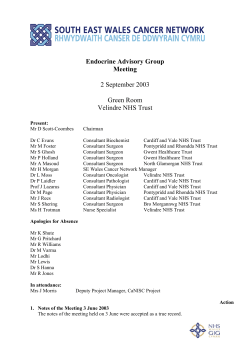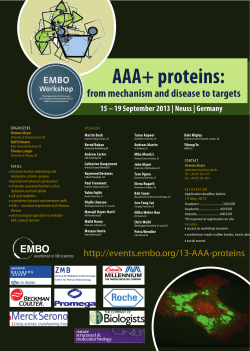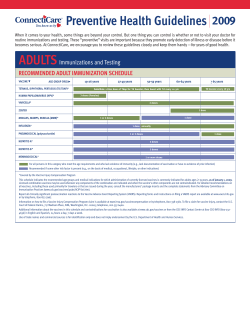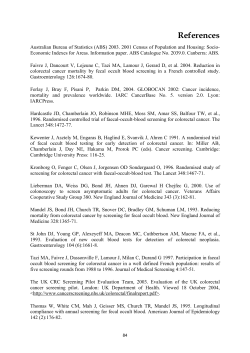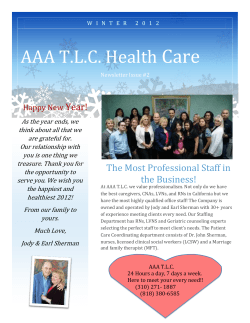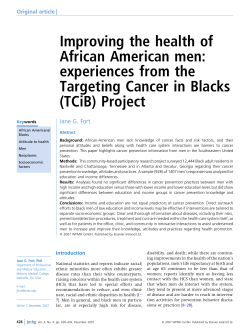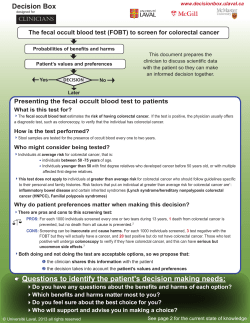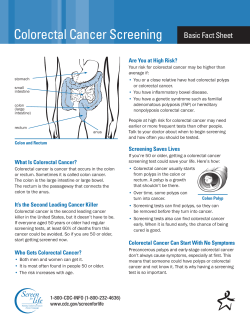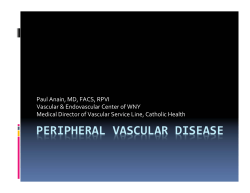
gp Flu Fighters in the country We’re the best
News for commissioners, GPs, practice managers, and primary care staff gp WE CARE FOR YOU Bowel cancer: Doncaster and Bassetlaw Hospitals NHS Foundation Trust January 2013 www.dbh.nhs.uk we’re one of the best for treating it We’re the best Flu Fighters in A Rose the country Award for Bassetlaw SCBU WE CARE FOR YOU Countdown to AAA screening Contents 3‘One of the best’, says National Bowel Cancer Audit 4Countdown to AAA screening 5Chronic pain team moves into new home at Montagu 5 Progress on waiting times recognised 5Former GP elected Trust governor 6Construction of rehab unit gets underway 7Benefits advice service launches for people with cancer 7 Welcome to new consultant 8Pharmacy robots cut waste and dispensing time 9New Cancer of Unknown Primary (CUP) service 9Bassetlaw Assessment & Treatment Centre opens We’re the best Flu Fighters in the country Doncaster and Bassetlaw Hospitals has achieved the honour of being the best hospital trust in England for vaccinating frontline staff against flu for the second year running. F igures published by NHS Employers showed that by the end of November, we were well ahead of the pack with an astounding 80.2% of all staff involved in direct patient care having had their flu jab. The percentage vaccinated has increased further since then and we expect to have the final figures in early spring. Bassetlaw’s SCBU wins a Rose Award The Special Care Baby Unit (SCBU) at Bassetlaw Hospital has won one of this year’s Worksop Guardian Rose Awards. The SCBU team was nominated for the award by the grateful parents of twin girls who were cared for on the eight-cot unit after being born prematurely in September 2010. Readers of the Worksop Guardian then voted SCBU the winner from the shortlisted candidates. Clinical lead and Consultant Paediatrician Dr Lai Men Wong, Senior Sister Marion Burchby and Sister Sue Proudman collected the award on behalf of the team at the awards ceremony on 29 November. Trust Chairman Chris Scholey with the Occupational Health ‘Flu Fighters’ after presenting them with certificates at the Board meeting on 4 December Mike’s set to become our new Chief Executive Pictured (I-r): Dr Lai Men Wong, Consultant Paediatrician; Senior Sister Marion Burchby; and Sister Sue Proudman (photo: courtesy of the Worksop Guardian) Mike Pinkerton has been selected as our next Chief Executive, subject to approval by the Board of Governors. Speaking of his selection, Mike said: “I am delighted to be recommended for this post, subject to the approval of the Board of Governors. I am really looking forward to working with GPs and other colleagues in primary care, the excellent staff in the Trust and with our partners in developing our services and continuously improving outcomes for patients.” If you have any comments or want further information about any of the articles in GP Info please get in touch with the Communications & Marketing team on 01302 647085 or email Emer Scott, Director of Communications & Marketing, on emer.scott@dbh.nhs.uk. 2 gp January 2013 One of the best for treating bowel cancer Doncaster and Bassetlaw Hospitals is one of the best in the region at treating patients with bowel cancer, according to a national report published on 17 December. T he National Bowel Cancer Audit 2012 analysed data on 30,000 patients treated for the condition in hospitals in England and Wales between August 2010 and July 2011. It found that we were the top-performing trust in the Yorkshire, Humberside and North Trent region at detecting bowel cancer early enough to avoid having to perform emergency surgery. Over 90% of patients at our hospitals were operated on via a planned list rather than having emergency treatment – the best performance in the region. It means patients benefit from the better clinical outcomes which result from prompt detection and treatment of their cancer, rather than an emergency treatment after an obstruction of the bowel. We were also one of the top trusts in the whole of England and Wales for ensuring that bowel cancer patients were under the care of the full team of relevant specialists, as recommended by the National Institute of Health and Clinical Excellence (NICE). Every patient was reviewed by the full multidisciplinary team and benefited from the expertise and opinions of consultant surgeons, a consultant oncologist and a consultant radiologist. We were the third best of all 15 hospitals in the Yorkshire, Humberside and North Trent region for ensuring that patients were under the care of a bowel cancer clinical nurse specialist (97.3 per cent, compared with the national average of 83 per cent) and that their CT scans had been interpreted by a consultant radiologist (98.4 per cent, compared with the national average of 88 per cent). Mortality rates 90 days after surgery were also well below the national average – the observed rate was just 3.2 per cent, compared with a national average of five per cent. Consultant Colorectal Surgeon and Colorectal Cancer Lead Mr Athur Harikrishnan said: “All our patients are offered high-quality laparoscopic surgery under the Enhanced Recovery Programme (ERP). Our excellent results reflect the expertise and hard work contributed by every member of our dynamic colorectal cancer multidisciplinary team.” Mr Athur Harikrishnan January 2013 gp 3 Countdown to AAA screening programme begins Men aged 64 and 65 in South Yorkshire and Bassetlaw are set to start receiving invitations for abdominal aortic aneurysm (AAA) screening from February 2013. T he new screening programme covers Barnsley, Bassetlaw, Doncaster, Rotherham and Sheffield and aims to reduce deaths from ruptured AAAs, which cost around 6,000 lives a year in England and Wales. From February, every man in South Yorkshire and Bassetlaw will be invited for screening in the year they turn 65. Men who are over 65 will be able to selfrefer for screening by contacting the programme directly to request an appointment. It is estimated that four per cent of all men aged 65 and over in South Yorkshire and Bassetlaw could have an AAA. There is an 80% risk of death if an AAA ruptures – one third of people die before they even get to hospital. AAAs usually have no symptoms. However, they are quick and simple to detect, which is why screening is so important, and surgical treatment to repair large aneurysms is usually very effective – the mortality rate for planned surgical repairs is only around 3-8%. From February, every man in South Yorkshire and Bassetlaw will be invited for screening in the year they turn 65. Men who are over 65 will be able to self-refer for screening by contacting the programme directly to request an appointment. The programme will be rolled out in phases across South Yorkshire and Bassetlaw. At least one screening centre is scheduled for each PCT/CCG area by February. Men receive their results straight away 4 gp January 2013 at their screening appointment. Those whose scans are normal – an aorta with a diameter less than 3cm – will be discharged. Men with a small aneurysm (3cm to 4.4cm) will be offered an appointment with a nurse practitioner and annual surveillance appointments to monitor the growth of the aneurysm. Men with medium aneurysms – aortas between 4.5cm and 5.4cm will be offered three-monthly surveillance and an appointment with a nurse practitioner. Men with large aneurysms of 5.5cm or greater will be referred to a consultant vascular surgeon within the local vascular network to discuss treatment options. Doncaster and Bassetlaw Hospitals has been commissioned to provide the screening programme for South Yorkshire and Bassetlaw. Men with large aneurysms will be referred to the vascular teams at Doncaster and Bassetlaw Hospitals and Sheffield Teaching Hospitals. “Screening is simple and it saves lives so we would really encourage men to take up the invitation. We would appreciate any assistance that GPs and other colleagues in primary care can provide in this and we would be very happy to speak or meet with you if you would like further information.” Mr Ray Cuschieri, Lead Clinician for the South Yorkshire and Bassetlaw AAA Screening Programme, Deputy Medical Director at Doncaster and Bassetlaw Hospitals and until recently a practising Consultant Vascular Surgeon, said: “Screening is simple and it saves lives so Mr Ray Cuschieri we would really encourage men to take up the invitation. We would appreciate any assistance that GPs and other colleagues in primary care can provide in this and we would be very happy to speak or meet with you if you would like further information.” Details of the first wave of AAA screening centres will be announced in the next few weeks. Men will be given their results verbally during their screening appointment. Those whose scans show abnormalities will also receive a letter. GPs will receive a summary results letter for every patient of theirs who is screened, regardless of the result. For more information or a visit in relation to the AAA screening programme in South Yorkshire and Bassetlaw, please contact: • Mr Ray Cuschieri, Clinical Lead, ray.cuschieri@dbh.nhs.uk or 01302 553121 • Helen McAlinney, AAA Screening Programme Coordinator, aaa.screening@dbh.nhs.uk or 01709 321189 New chronic pain unit at Montagu The chronic pain team has moved into its new home at Montagu Hospital, with expanded treatment rooms and clinic facilities and more comfortable waiting areas for patients. T he whole service now operates from the same part of the hospital in significantly enhanced facilities with a light, airy environment. The new Pain Management Unit has two seven-bed treatment wards where spinal injections, acupuncture and other forms of care for soft tissue problems can be provided. Both wards have been designed for single-sex use to protect patients’ privacy and dignity. There is a minor operating room with x-ray facilities for injection procedures where imaging facilities can help the doctor guide the needle into the correct position. The unit also has a further individual treatment room, five consultation and examination rooms, and five interview rooms where patients can have cognitive behavioural therapy or follow-up appointments with a specialist nurse. k Reilly; Chronic Pain Lead and Back row (l-r): Psychotherapist Dere rt na Yerneni; and Charge Nurse Stua Consultant Anaesthetist Dr Krish ker; and Shan Starr; General Manager Ashy Andrew. Front row (l-r): Sister Lisa Physiotherapist Karen Sharkey Recognition for progress on waiting time Our work to address the historic waiting list issues identified this summer has been recognised by an unlikely source. ‘NHS Gooroo’ is a blog with news updates and articles on waiting times for NHS care across the country. The November issue congratulated us for the fact that 92% of our patients now wait 17 weeks for treatment, down from 18.3 weeks. We still have a lot of work to do but waiting times are definitely heading in the right direction and we’re on track with our plans to improve them further and ensure we have accurate, up-to-date waiting-time information about every one of our patients. Dr Utpal Barua elected Public Governor Dr Barua, a retired GP form Worksop, who worked in Langold, Langwith and Cresswell, has joined our Board of Governors to represent the people in Bassetlaw. Dr Barua, who was elected as a Public Governor for Bassetlaw, said: “I believe that close working between health and social care can address socially-determined health inequalities to the benefit of society. As a new governor, I am looking forward to working with Dr Utpal Barua the Trust to achieve this.” January 2013 gp 5 Artist’s impression of the exterior of the new centre Construction begins on new rehab unit at Montagu Construction work on the new rehabilitation centre at Montagu Hospital is set to begin in early January. T he new unit, set to open by summer 2013, will transform the way that people recovering from serious injury or illness are cared for and it is believed it will be the first of its kind in the UK. Unlike traditional hospital rehab, patients will receive their own personalised programme of intensive therapeutic care seven days a week, tailored to meet their individual needs. The unit will have a warm and homely atmosphere with kitchen facilities and relaxation areas so patients build ordinary daily activities like making breakfast or reading the paper into their recovery. The new unit will be constructed on the site of some existing buildings that were no longer in use. The site was cleared in November and December and construction is set to begin in mid-January. 6 gp January 2013 , Artist’s impression of an activity area with a view of the courtyard Doncaster Macmillan Welfare Benefits Advisers A new advice service has been introduced at Doncaster Royal Infirmary, supporting people affected by cancer to claim the welfare benefits they are entitled to. C alled the Doncaster Macmillan Welfare Benefits Service, it’s a joint venture between Macmillan Cancer Support, Bassetlaw Citizens Advice Bureau and Doncaster and Bassetlaw Hospitals NHS Foundation Trust. The service, which accepts referrals from GPs, has been set up because people with cancer often say their biggest worry, aside from their diagnosis and treatment, is how they are going to manage financially. Often, they don’t realise that financial support is available. The new service at DRI can offer advice and support to anyone with cancer in the Doncaster area, their relatives and carers, and anyone else who incurs additional financial costs by helping someone with cancer. A Macmillan welfare benefit adviser visits the patient, carries out a financial assessment and then informs them of any benefits and grants they can claim. The adviser completes all the paperwork and will even chase up claims to minimise delays in payment. They can also help people challenge benefits decisions, as well as advising on grants and disabled Blue Badge applications and have successfully overturned Blue Badge refusals. People can self-refer to the new service. It also accepts referrals from clinics at DRI, Macmillan Clinical Nurse Specialists, GPs, community groups and other agencies. The team can advise DRI patients from outside Doncaster and signpost them to agencies in their local area that can support them and carry out home visits where required. People with cancer in Bassetlaw already enjoy a similar service which is available through Bassetlaw Citizens Advice Bureau. Doncaster Macmillan Welfare Benefits team (I-r) Emma Widdowson, Macmillan Admin Assistant; Gail Bull, Macmillan Welfare Benefits Adviser; and Jo Reeve, Lead Macmillan Welfare Benefits Adviser Welcome to our new consultant D r Mathew Kaduthodil has started in post as a Consultant Radiologist specialising in hepatobiliary and gastrointestinal imaging. Since joining the consultant radiology team, Dr Kaduthodil has been instrumental in setting up a virtual patient-centred colonoscopy and gastrostomy service. Dr Kaduthodil graduated from the Kasturba Medical College in India and went on to become a Member of the Royal College of Physicians and a Fellow of the Royal College of Radiologists. He won the Grainger Prize in 2007, a prize awarded each year for the best audit presentation by registrars in the Sheffield Radiology Training Scheme. Talking about his appointment, Dr Kaduthodil said: “I am very pleased to be working with such a dynamic and talented group of people providing a top rate radiology service to the people of Doncaster and Bassetlaw.” January 2013 gp 7 High-tech Pharmacy robots The Pharmacy departments at Doncaster and Bassetlaw Hospitals have been extensively modernised and equipped with the latest high-tech automated ‘robots’ playing a key role in the dispensing and storage of pharmacy medicines. The robots were the final phase of our Pharmacy development, which also included the innovative facility run by The Cooperative Pharmacy for people attending DRI’s Outpatients and Emergency Department. S ince going live, the new V-Max robots have made their mark and speeded up the dispensing service for patients on the wards at both hospitals. On average, medicines prescribed for inpatients are now dispensed and delivered to the wards in half the time it previously took. The robots have also saved us £300,000 by enabling stock to be managed more effectively, keeping track of when medicines are due to expire, and reducing wastage through expired medicines by almost 20%. Pharmacy staff send the robots a prescription to dispense via the computer. The robot arm whizzes along the shelves and selects the right medication. It then labels the package with the patient’s details and instructions on how to take the medicine and dispatches it through a system of conveyers to the member of staff who has requested it. The robots have also saved us £300,000 by enabling stock to be managed more effectively, keeping track of when medicines are due to expire, and reducing wastage through expired medicines by almost 20%. The robots were the final phase of our Pharmacy development, which also included the innovative facility run by The Cooperative Pharmacy for people attending DRI’s Outpatients and Emergency Department. The Cooperative Pharmacy opened in March 2012 and provides a much improved service between 9.00am and 6.30pm on weekdays, plus Saturday mornings. A delivery service is also offered to patients with repeat prescriptions and those who prefer not to wait. 8 gp January 2013 DRI’s tandem V-Max robot in action New Cancer of Unknown Primary (CUP) service A new service has been set up for patients whose primary cancer is unknown. Previously, these patients could experience long stays in hospital with disparate investigations and diagnoses which could leave them feeling unsupported. F ollowing the introduction of the Cancer of Unknown Primary (CUP) service, patients are seen the same working day for assessment and advice through direct referrals and have their cases discussed at the CUP Multi-Disciplinary Team (MDT). The CUP service started in April and patients at DRI and Bassetlaw Hospital are benefiting from being seen earlier in their care pathway by specialists providing advice on management and support. Patients also have fewer inappropriate investigations and shorter stays in hospital in line with national guidance (NICE and Cancer Peer Review). The team includes a specialist palliative medicine physician, an oncologist, a palliative care specialist nurse, a cancer specialist nurse and a cancer of unknown primary nurse. Between April and October 2012, the CUP MDT discussed 30 patients in this category. The team is now working towards introducing a primary diagnostic clinic for CUP patients who are referred for follow-ups, offering support to outpatients, and starting education sessions for clinicians. For further information, please contact Lesley Barnett, Lead Cancer Nurse, on 01302 553194 or lesley.barnett@dbh.nhs.uk or Dr Justin Fernando, CUP Lead, on justin.fernando@dbh.nhs.uk. ialist; Gavin millan Upper GI Cancer Nurse Spec Pictured (l-r) Yvonne Elmore, Mac t Clinical ultan Cons terology; Dr Jon Wadsley, Hill, Associate Specialist, Gastroen /CUP Lead Care , Consultant in Specialist Palliative Oncologist; Dr Maurice Fernando /CUP CNS and Debbie Jordan, Acute Oncology Bassetlaw Assessment & Treatment Centre (ATC) now open The new Assessment & Treatment Centre (ATC) has now opened on the old C2 at Bassetlaw, replacing the Medical Assessment Unit (MAU). Meanwhile, C2 has moved to the old CCU area and now includes the cardiac care beds; it will also care for diabetes and endocrinology patients. The ATC was developed with Bassetlaw commissioners and follows a series of changes to increase specialist medical and nursing input into the care of emergency patients who need ongoing assessment. We now have consultants on the ATC covering 10 hours each day, seven days a week and have made preliminary changes to increase the space available for assessing and treating ambulatory patients. The ATC will continue to evolve in coming months and the next phase will include increased input from therapy and diagnostics. The aim is to improve care, outcomes and length of stay for patients who need emergency assessment in Bassetlaw. January 2013 gp 9
© Copyright 2025
